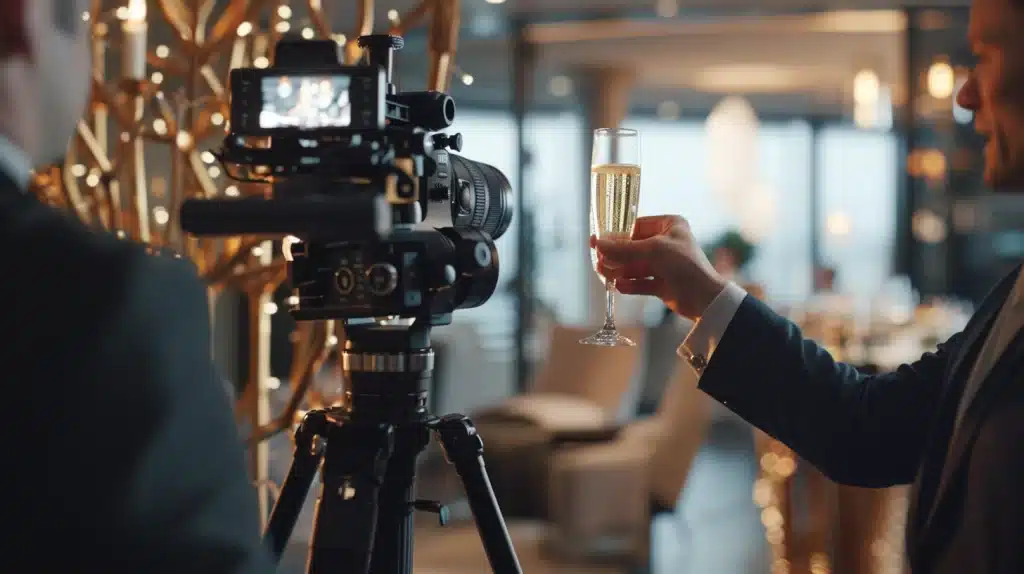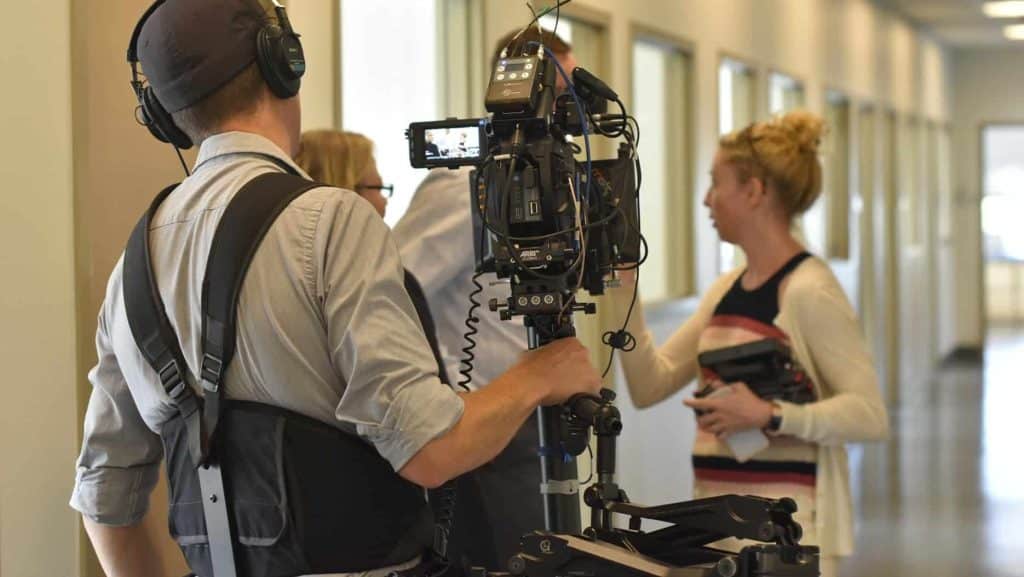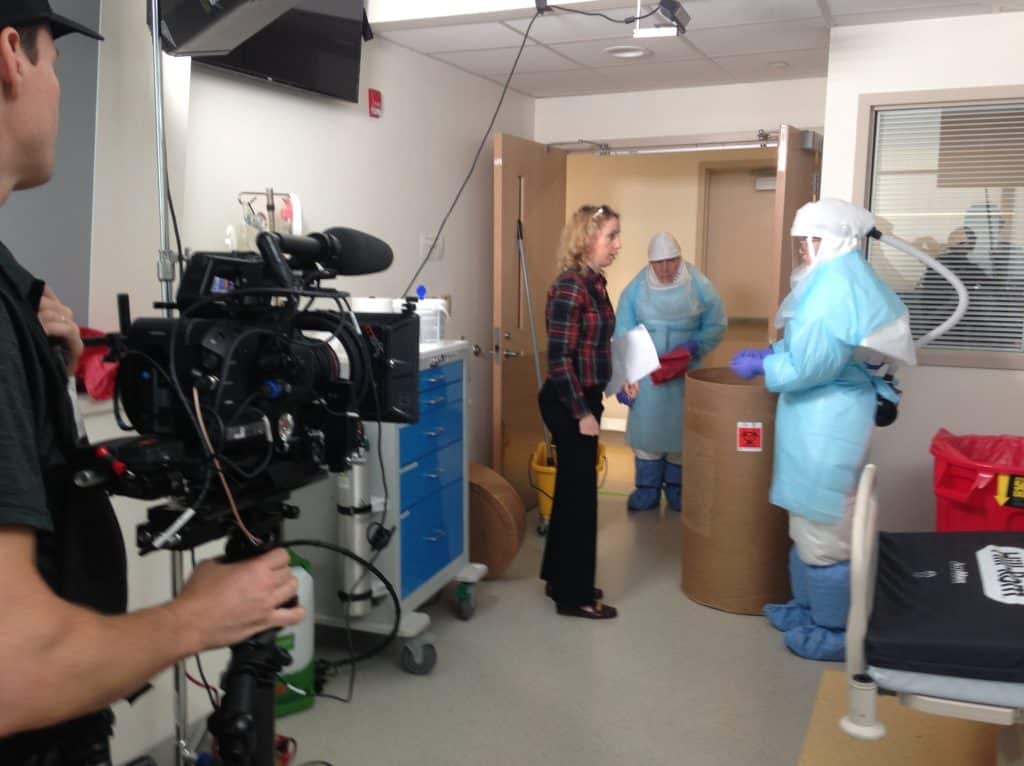Videographer or Director of Photography: Which One Do You Need for Your Next Video Project?
The video production industry is a complex web of different roles and responsibilities.
For those who are not familiar with the industry, it might be easy to lump all video production roles together into one big category. However, it’s not quite that simple!
All video production roles exist in something we like to call the “video ecosystem.” Before beginning a new video project, it is crucial that you take the time to understand the different roles within the ecosystem.
Once you understand the roles and their functions, you can be certain that you are hiring the right industry professional and be well on your way towards achieving marketing success!
Table of Contents
The Video Ecosystem: An Overview
Video production companies offer a wide range of services, depending on their abilities, in what we like to call the “video ecosystem.”
Think of this ecosystem just like one you would find in nature: a complex network of interacting systems. The video ecosystem is composed of different levels, from DIY all the way up to a full-scale video agency.
There is a lot of variety in these levels, which means there are a lot of decisions to make on what level is best suited for your brand’s needs.
The company brand image you create and the marketing messages you send to your audience play a key role in the success of your business.
The more educated you are on the video ecosystem, the better decisions you can make about your next brand video project in order to obtain the best results possible.
Understanding Key Roles: Videographer vs. Director of Photography
Two significant terms in the video ecosystem, videographer and director of photography (or DP), get used interchangeably by those who are not familiar with the ecosystem.
Contrary to popular belief, these two roles are completely different!
While the work of videographers and DPs both involves filming action with a camera, there is a significant difference between the two.
Understanding these terms can put you on the path to finding the right people to take on your video project to ensure success.
Videographer: Think Simple

When you think of a videographer, think “simple.” First and foremost, a videographer is a person who works in the field of video production.
Videographers tend to take on basic projects and are responsible for recording small-scale productions. After all, they are usually just a one-man band with a camera and a tripod!
Some projects videographers are responsible for working on include:
- Live events
- Short films
- Birthday parties
- Sporting events
- Weddings
- Bar/Bat Mitzvahs
- Conferences
- Presentations or talks
When you see someone walking around a wedding or a Bar/Bat-mitzvah with a camera, that’s a videographer!
These events are pretty straightforward, which makes them easy to shoot and can usually be carried out by one person.
Another instance where you might want a videographer is if you are delivering a presentation on a particular subject.
The videographer brings a tripod and a camera, sets up the equipment, and points and shoots. Their primary focus is on capturing the essential moments of the event. They usually do not have control over how the event actually unfolds.
Although there is only one simple action to capture, that does not mean a videographer does not experience challenges.
Videographers work hard to make sure they are making your project look spectacular. This includes framing an event correctly, keeping a close eye on the camera, and making sure the audio is coming through clearly and sounds superb.
The Art of Videography
However, the role of a videographer is not merely about pointing and shooting. It involves a level of artistry. Videographers must have a keen eye for capturing candid moments and ensuring that the footage tells a compelling story. Their expertise in working with lighting, sound, and framing transforms even the simplest events into memorable visual narratives.
Director of Photography: The Next Level

The next level is a Director of Photography (DP). The role of a DP is not as simple as that of a videographer.
A Director of Photography supervises the camera and lighting crews on a film, television production, or other live-action project. They are responsible for the visual style of a video.
They do this by making both artistic and technical decisions related to the picture on screen. They are also in charge of selecting and testing equipment, as well as understanding a project’s visual elements throughout the entire production process.
Another term you might have heard that is used to refer to people who do this type of work is a cinematographer.
A director of photography and a cinematographer are different terms developed for similar roles in the industry. Generally, a DP is a more technical term for a leadership job; like a director of a movie, a DP has full creative control over the photography aspects of that production.
A more accurate term for “cinematography” is “the art of making motion pictures.” Typically, a Bar/Bat-Mitzvah would neither be considered an art nor a motion picture.
Some projects DPs are responsible for working on include:
- Corporate videos
- Brand videos
- Music videos
- Movies
- Television shows
- Commercials
These are the people who have been doing it for a long time! They usually have experience working with top-tier equipment and bring a great deal of creativity and collaboration to the table.
Because of this, DPs make clients’ ideas come to life on screen by selecting the proper cameras, camera lenses, and lighting set-ups that deliver the best product possible.
Every decision the DP makes must align with the story being told as well as with what the director is trying to convey.
The Creative Vision of a DP
Imagine you are watching a Batman movie, like The Dark Knight. Do you notice the dark, icy blue/gray tint to the movie? Does it evoke feelings of intensity and eeriness within you?
You have the DP to thank for that! In order to create this feeling in video production, Directors of Photography focus on:
- Visual style
- Lighting (controlling and creating lighting conditions)
- Camera angles and framing
- Testing camera equipment
- Determining elements such as filters, focus, depth, and camera distance
Unlike the work of a videographer, DPs have a lot more on their plate. They work on more complex projects and bring a real sense of artistic vision to every venture.
This artistic vision is essential to creating an emotional connection with the audience. Through careful manipulation of light, shadow, and camera movement, DPs craft a visual language that enhances the narrative and mood of the project.
Choosing What’s Best for You, Your Budget, and Your Business

There is tons of opportunity for all in the video ecosystem.
Audiences today are becoming more demanding and media-savvy; it takes a lot of work to stand out and grab their attention!
Because of this, you need to be clear on your intentions for a video, especially when you are hiring an industry professional.
Ask yourself…
How do I want my event or message captured?
Working with a videographer can be an excellent choice, as long as you’re aware of what you’re getting and feel it is a proper fit for you and your project.
Considering how you want your message represented is a great first step in choosing between a videographer and DP.
What is my budget?
Budget is also another important factor to consider when choosing between a videographer and a DP. Sometimes, you might be overpaying to work with a DP.
If your project is small and simple (say, you are giving a talk and want it to be recorded), paying for a DP is more than you need.
That is an instance where you would select to work with a videographer to better fit your needs and budget!
What messages do I want to send to my audience, and how?
Not only should you decide on the tone and purpose of your video, but you should also really think about your brand and who you are.
The type of professional you hire depends on the brand messages you are trying to send to your audience.
Maximizing Your Investment
It is important to remember that the video ecosystem is not one-size-fits-all. It is a complex structure for someone who is new to the industry, and it can be easy to lump everything video-related together.
By carefully considering your specific needs and goals, you can maximize your investment in video production.
Whether you choose a videographer for straightforward projects or a DP for more intricate productions, understanding the nuances of each role ensures that your final product will effectively communicate your message and resonate with your audience.
Do You Need a Videographer or a Director of Photography?
Frequently Asked Questions
What is the primary difference between a videographer and a director of photography?
The primary difference between a videographer and a director of photography (DP) lies in the scope and complexity of their roles.
A videographer typically handles small-scale projects such as live events, weddings, and presentations, often working solo with minimal equipment. Their focus is on capturing essential moments with a straightforward approach.
On the other hand, a DP oversees more complex productions like movies, TV shows, and corporate videos, managing both the camera and lighting crews. They bring a higher level of artistic and technical expertise, making critical decisions about the visual style and narrative of the project.
Understanding these distinctions helps in selecting the right professional based on the project’s demands and budget.
When should I hire a videographer for my project?
You should hire a videographer for projects that are straightforward and do not require extensive artistic direction or complex equipment setups.
Common scenarios include capturing live events, recording presentations, or filming social gatherings like weddings and birthday parties. Videographers are well-suited for these tasks as they can efficiently manage the recording process on their own, ensuring that essential moments are captured clearly and effectively.
Their services are often more budget-friendly, making them an ideal choice for smaller projects where high-end production values are not necessary. By choosing a videographer for these types of projects, you can ensure a good balance between cost and quality.
What advantages does a director of photography bring to a video production?
A director of photography (DP) brings significant advantages to video production through their expertise in visual storytelling and technical proficiency.
They are responsible for the overall look and feel of a project, making key decisions about lighting, camera angles, and shot composition. This artistic vision enhances the narrative, creating a more immersive and emotionally impactful experience for the audience.
DPs also manage the camera and lighting crews, ensuring that all technical aspects align with the director’s vision. Their ability to select and operate advanced equipment further elevates the production quality, making DPs essential for high-stakes projects like films, commercials, and music videos.
How do I decide between hiring a videographer or a DP for my project?
Deciding between hiring a videographer or a director of photography (DP) depends on several factors, including the project’s complexity, budget, and intended message.
For simpler projects like event coverage or basic promotional videos, a videographer is often sufficient. They can handle the task independently and provide quality results at a lower cost.
However, if your project requires a high level of visual artistry, complex setups, and a detailed narrative approach, a DP is the better choice.
Assess your goals, the desired visual style, and your budget to make an informed decision. Understanding your specific needs ensures that you hire the right professional to deliver the best outcome for your project.
What should I consider about my brand and message when choosing between a videographer and a DP?
When choosing between a videographer and a director of photography (DP), it’s crucial to consider how you want your brand and message to be represented.
Reflect on the tone, style, and complexity of the video you wish to create. If your brand values simplicity and direct communication, a videographer can capture the essence of your events or presentations effectively.
However, if your brand aims to convey a sophisticated and polished image, or if your project involves intricate storytelling and high production values, a DP can bring that vision to life.
Aligning the professional’s expertise with your brand’s identity and message ensures that the final product resonates with your audience and enhances your brand’s reputation.
Share:
Search our blog:
Follow us on:
